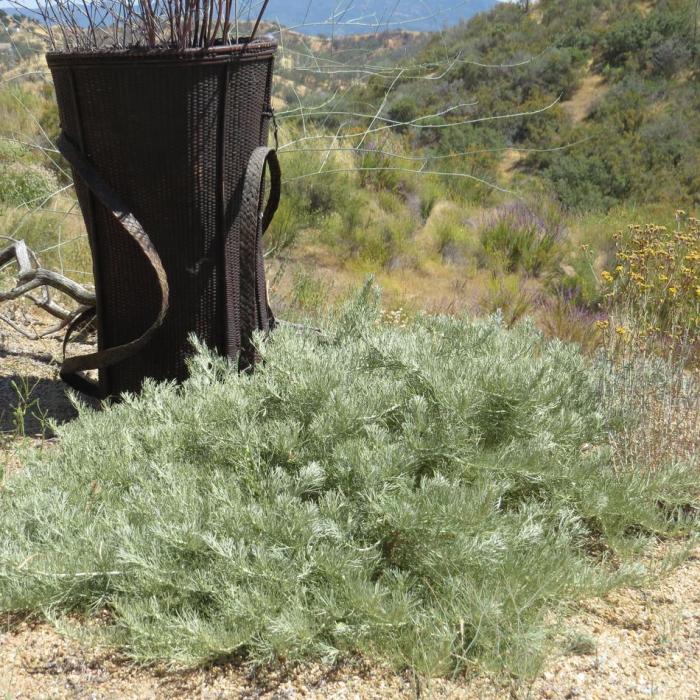
Artemisia californica 'Canyon Gray'
Canyon Gray Sagebrush

Description
Canyon Gray Sagebrush (Artemisia californica 'Canyon Gray') is a natural cultivar of California Sagebrush (Artemisia californica) from San Miguel Island, one of the Channel Islands in Southern California. This prostrate horticultural selection was collected and introduced by the Santa Barbara Botanic Garden. This plant can become a large scale ground cover, quickly forming a 1 to 2 feet high, compact mat of finely textured, silvery, gray-green foliage, that spreads 4 to 10 feet wide. It works well on dry slopes and draping down over walls, even a lawn substitute. The flowers are fairly inconspicuous, the foliage is very aromatic when brushed. Canyon Gray Sagebrush requires little irrigation once established, though it can go semi-dormant by later summer without occasional irrigation. It is reportedly hardy to about 20-25° F. It tolerates almost any soil type with drainage. It prefers full sun in coastal sites, and sun to part shade in inland sites. To keep the fast growing foliage dense, the plantings can look best if 'mowed' or heavily trimmed down every 1 or 2 years. Deer resistant. Foliage is evergreen but will become semi-deciduous during the summer if there is no irrigation.
Plant Type
Shrub, Ground cover
Height Range
1-3'
Width Range
1-3', 3-6'
Flower Color
n/a
Flower Season
n/a
Leaf Color
Grey Green, Grey, Silver
Bark Color
n/a
Fruit Color
n/a
Fruit Season
n/a
Sun
Full, Half
Water
Very Low, Low
Growth Rate
Fast
Soil Type
Sandy, Loam, Rocky
Soil Condition
Average, Well-drained
Soil pH
Neutral
Adverse Factors
n/a
Design Styles
Meadow, Mediterranean, Ranch, Seascape, Spanish
Accenting Features
Fragrance, Unusual Foliage
Seasonal Interest
Winter, Spring, Summer, Fall
Location Uses
Shrub Border, Parking Strip, Patio, Parking Lot, Raised Planter, Roadside, Walkways, With Rocks
Special Uses
Erosion Control, Mass Planting, Lawn Substitute, Naturalizing
Attracts Wildlife
n/a
Water Saving Tip:
Check your irrigation controller once a month, and adjust as necessary.
Most plants require only one-third as much water in winter as they do in summer.